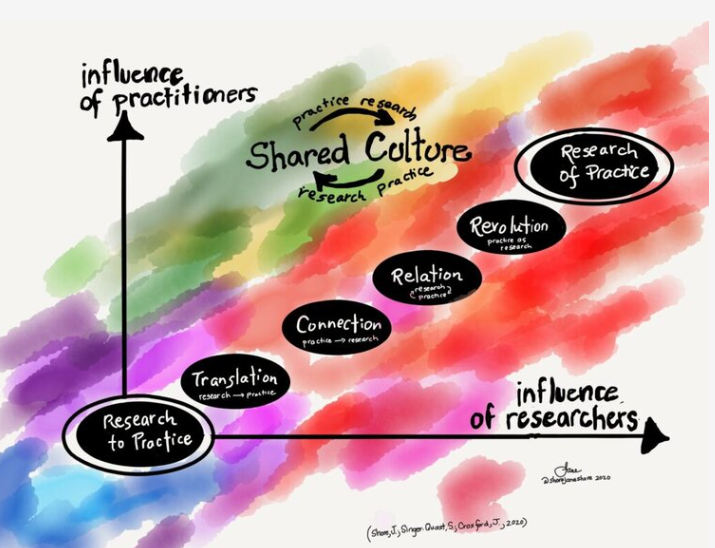Market or consumer research
In April 2022 the theme for Methodspace was “Be practical: Research beyond academia.” One place where research practices are common is in market or consumer research. Businesses large and small, governmental agencies and NGOs need to understand who needs, wants, accesses, uses, and purchases products and services. Even academics and researchers need to think about ways to reach the people who can benefit from their publications, social media or blog posts, or presentations. This open-access collection includes thought pieces and research articles that offer some examples of studies conducted for market and consumer research purposes.
De Vecchi, N., Kenny, A., Dickson-Swift, V., & Kidd, S. (2017). Exploring the Process of Digital Storytelling in Mental Health Research: A Process Evaluation of Consumer and Clinician Experiences. International Journal of Qualitative Methods. https://doi.org/10.1177/1609406917729291
Abstract. Digital storytelling is an art-based research method that has potential to engage mental health consumers and clinicians in dialogue about their lived experiences. However, few studies have examined the process of digital storytelling and people’s perspectives about making digital stories. In this article, a process evaluation framework is used to explore two digital storytelling workshops conducted with mental health consumers and clinicians. Project planning and implementation documents were collated, and interviews conducted with workshop participants thematically analyzed. Data were combined with facilitator reflections and are reported using a process evaluation framework. Findings indicate that the digital storytelling process is a useful research method that can be used to create a space where power differentials between consumers and clinicians are made visible and shared dialogue can develop. Recommendations from the study include the importance of employing skilled consumer and clinician support personnel to guide the process of participation and negotiate ethical tensions to ensure participant safety.
Jafari, A. (2022). The role of institutions in non-Western contexts in reinforcing West-centric knowledge hierarchies: Towards more self-reflexivity in marketing and consumer research. Marketing Theory. https://doi.org/10.1177/14705931221075371
Abstract. Critics often associate West-centric knowledge hierarchies in marketing (as well as in business and management studies) with (neo)colonialism, academic journal ranking fetishism, resource scarcity in non-Western societies, and the domination of the English Language in the international scholarly landscape. I advance this debate by examining the role non-Western societies themselves have played in reinforcing the phenomenon. Using the Muslim Middle East as a context, I argue that the coupling of the institutions of state politics and religion during the 20th century has negatively influenced the development of social sciences. I show how unreflexive Islamic civilizational revivalism has paradoxically contributed to the reproduction of the same hegemonic discourse it intended to repudiate. These, I argue, are the outcomes of the institutional arrangements that Western colonial/imperial powers have left behind in subordinate societies. I conclude by inviting researchers in both Western and non-Western contexts to develop a sense of self-reflexivity, one that can help create more consciousness about how what they write can impact upon self and others.
Kipnis, E., Demangeot, C., Pullig, C., Cross, S. N. N., Cui, C. C., Galalae, C., Kearney, S., Licsandru, T. C., Mari, C., Ruiz, V. M., Swanepoel, S., Vorster, L., & Williams, J. D. (2021). Institutionalizing Diversity-and-Inclusion-Engaged Marketing for Multicultural Marketplace Well-Being. Journal of Public Policy & Marketing, 40(2), 143–164. https://doi.org/10.1177/0743915620975415
Abstract. Within an institutional theory framework, this article identifies three interconnected fields of the marketing institution—research, education, and practice—that contribute to advancing the diversity and inclusion discourse in promoting multicultural marketplace well-being. Conducting three studies, one in each field and across contexts in three continents, the authors identify barriers that inhibit effective implementation of diversity and inclusion initiatives in today’s multicultural marketplaces. These barriers exist within and across fields and pertain to cultural-cognitive (shared meanings), normative (normative factors), and regulatory (rules and systems) pillars supporting the existence or transformation of institutions. From the research findings, the authors provide specific guidance for institutional work within marketing’s fields and policy developments needed to advance diversity-and-inclusion-engaged marketing for enhancing multicultural marketplace well-being.
Audy Martínek, P. (2021). Mapping methods of research on consumer engagement with brands on social media: A literature review. Methodological Innovations, 14(1). https://doi.org/10.1177/2059799120985384
Abstract. Consumer-brand engagement on social media is a widely studied research topic with high relevance for marketing practitioners. However, the discipline is affected by a conceptual divergence and limited understanding of applicable research methods. The purpose of this article is to review the extant empirical research in the marketing literature that investigates consumer engagement with brands on social media, provide an overview of the research methods employed, and suggest implications for future research. Through systematic review of 66 published studies, this article aims to explore what methods are used to empirically investigate consumer engagement with brands on social media and asks how these methods have evolved over time. The study categorises the current research and demonstrates the evolution of research methods and themes from 2011 until 2019. This literature review revealed three observations: (a) low methods’ diversity, (b) dominant reliance on visible social media metrics and (c) negative aspects of consumer brand engagement as an emerging theme. The insights developed and the observed trends can be helpful in shaping future research and practice in the field of consumer brand engagement.
Mytton, G., Desai, P., & Nairn, A. (2021). Can market research change the world for the better? International Journal of Market Research, 63(1), 3–8. https://doi.org/10.1177/1470785320983237
Abstract. The intention of this special edition of the International Journal of Market Research (IJMR) is to draw attention to the contribution of market research to international development. Is market research capable of helping to change the world for the better? The top 30 donor countries currently give over $200 billion in development aid annually.1 Further substantial amounts come from charitable foundations, faith-based groups, United Nations (UN) agencies, and other sources. However, until the early noughties, surprisingly little market research and almost no opinion research was carried out either to inform or evaluate the use of these funds. The reasons are not entirely clear, although there has undoubtedly been some resistance to using market research techniques which have been viewed by some as inappropriately focused on making profit for the private sector and thus not helpful or relevant in the areas of health, welfare, education, or the relief of poverty.
Sandikci, O. (2022). The scalar politics of difference: Researching consumption and marketing outside the west. Marketing Theory. https://doi.org/10.1177/14705931221074721
Abstract. This paper explores the relationship between knowledge hierarchies and sociospatial ordering of the world and, in doing so, to problematize the ways we study and understand consumption and marketing outside the West. By sociospatial ordering of the world, I refer to scalar divisions that organize and mobilize hierarchical perceptions of the world. Adopting a view of scale as a way of knowing and apprehending the world, I trace the origins, uses and effects of three scales – Third World, non-Western and emerging markets – that organize and inform research about marketing and consumption outside the West. Each of these scales indicates an imagined distance from an assumed central point and mobilizes visions that order and organize not only places, but knowledge produced in and about these places. I show that these scalar configurations are neither neutral nor transparent designations, but politically charged, sociospatial constructions that privilege certain representations, meanings and identifications over others. In the process, they shape knowledge production, permitting particular forms of difference – absence, plurality and excess – to take shape, circulate and gain legitimacy. I conclude by discussing the possibility of a notion of difference that does not rest on a negative comparison between two entities but is generative, affirmative and non-hierarchical.
Sharma, G., & Kumar, P. (2021). An Analysis of Causal Relationships Among the Factors Affecting the Performance of a Service Organization. SAGE Open. https://doi.org/10.1177/2158244021999394
Abstract. In the present scenario, services have the largest domination in consumers’ lives and constitute a large part of the world economy. The researchers and practitioners have given limited research attention to transformative consumer research which affects consumer well-being. In this study, a causal relationship among the factors influencing the performance of an organization providing the transformative services has been analyzed using total interpretive structural modeling (TISM). The factors influencing the services have been identified through the literature review. After identifying the factors, TISM has been used to interpret the direct as well as significant transitive linkages among the factors. The empirical results suggest that top management plays a big role in consumer well-being along with the welfare of society. Devotion toward the well-being of the broader level of society depends on the top management’s commitment toward corporate social responsibility and respect for the rule of laws. These are the major factors influencing the performance of the organization other than employee satisfaction, excellent service quality, use of information technology and e-commerce, and so on.
Stewart, R. (2021). Big data and Belmont: On the ethics and research implications of consumer-based datasets. Big Data & Society. https://doi.org/10.1177/20539517211048183
Abstract. Consumer-based datasets are the products of data brokerage firms that agglomerate millions of personal records on the adult US population. This big data commodity is purchased by both companies and individual clients for purposes such as marketing, risk prevention, and identity searches. The sheer magnitude and population coverage of available consumer-based datasets and the opacity of the business practices that create these datasets pose emergent ethical challenges within the computational social sciences that have begun to incorporate consumer-based datasets into empirical research. To directly engage with the core ethical debates around the use of consumer-based datasets within social science research, I first consider two case study applications of consumer-based dataset-based scholarship. I then focus on three primary ethical dilemmas within consumer-based datasets regarding human subject research, participant privacy, and informed consent in conversation with the principles of the seminal Belmont Report.












In this guest post Catherine Collins describes ways to put action research principles into practice.